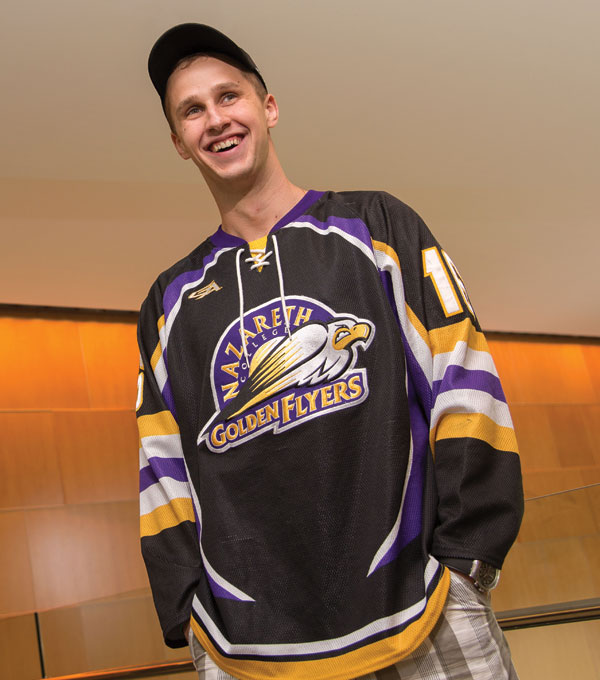The Russian Bear
by Joe Seil
As miracles go, the United States Olympic hockey team’s upset of the Soviet Union in Lake Placid more than three decades ago is a doozy. It was so epic that in 1999 that so-called “miracle on ice” was tapped by Sports Illustrated as the top sports moment of the 20th century.
The magnitude of that moment, which has only grown over time, is somewhat lost in translation for Nazareth’s Mark Zavorin ’15, who was born in Moscow in 1991, more than 11 years after that immortal U.S. team stunned the Russians, 4-3, in a most improbable sports upset. Less memorable is the U.S. team’s subsequent win over Finland in the gold-medal game.
“I know about it,” says Zavorin, a 22-year-old who recently completed a two-year career as a member of the Nazareth hockey team, “but I don’t really know that much about it.”
“We kid him a bit, but it’s all in good fun,” says team captain Scott Dawson ’16, an Ottawa native who shares a house in Pittsford with Zavorin and three other hockey players. “Every once in a while, the boys will throw the Miracle movie into the DVD player.”
U.S. relations with Russia have thawed since that fateful winter, paving the way for global odysseys like those of Zavorin, who played a significant role in helping the Golden Flyers launch their newest sports program, ice hockey, in the fall of 2012. As a sturdy 6-foot-2, 195-pound forward, Zavorin (nicknamed the Russian Bear by Dawson) became Nazareth’s top scorer through the first two seasons with 44 points on 19 goals and 25 assists. While he didn’t help the Golden Flyers create their own hockey miracle, Zavorin’s contributions have been noteworthy.
In just the third game in the history of the fledgling program, Zavorin erupted for five goals and one assist in a 7-2 victory at Brockport.
“I’m not sure he knows how good he could be,” says Head Coach George Roll. “The last goal he scored in the Brockport game was as pretty a goal as you’ll see. He just flipped a backhander between the crossbar and the goalie’s shoulder.”
“It was fun to be part of the first team,” says Zavorin, a biochemistry major with an eye on medical school after he graduates from Nazareth. “Playing hockey here has been like being part of a big family.”
That’s especially evident with his off-campus living arrangements. Since he’s the only one of the five without a car, Zavorin relies on his roommates for transportation back and forth to Nazareth and to the Bill Gray’s Regional Iceplex, where the Golden Flyers play their home games.
“None of us knew each other when we got here, so we got lucky because we all get along so well,” says Dawson.
Zavorin came to North America in 2009 as a precocious teen-ager with a hunger for a competitive brand of hockey and a desire for a contemporary education. “Back home you can’t do both,” he says.
He played junior hockey in Canada for a year, but his initial struggle to learn the English language made it difficult to find a college that would accept him. He spent two years at County College of Morris in New Jersey, where his English improved and he scored goals in bushels as he twice was honored as a junior college All-American. The next stop was Nazareth, where Roll was in the process of assembling a roster in preparation for the first season. “After I visited, I never considered going anywhere else,” Zavorin says.
“His overall presence on the ice is what stood out,” says Roll, whose Golden Flyers improved from six wins in their first season to eight in 2013-14. “You could just tell that he had all the tools to be a successful player at our level. He was the prototypical power forward who’s tough to move off the puck.”
“He’s one of the most skilled guys I’ve played with,” says Dawson. “He’s a fast and powerful skater and a pure scorer.”
Roll is quick to point out that Zavorin’s focus ranges beyond the frozen pond. He would ultimately like to follow in the footsteps of his mother, Irina, a doctor in his native Russia.
“He made a seamless transition,” Roll says. “He’s serious and focused on what he wants to do.”
Zavorin started playing hockey at age 6 and played in all the top leagues in Moscow until he was 17 and decided he needed to be in North America. The biggest challenge, aside from the language barrier, was in determining whether he would like it here. “I was a little homesick at first, but hockey helped me adjust,” he says.
Left behind in Russia are his parents Sergey and Irina and sisters Karina, 30, and Mariya, 27. None of his family members have seen him play at Nazareth, but they’ve been able to monitor his growth through the Nazareth website and via webcasts of the Golden Flyers’ games.
“I’m not really ready for them to come here,” he says, “but we talk just about every day on Skype.”
“I couldn’t imagine,” says Dawson. “The farthest I’ve been from home is when I came to Nazareth and that’s only four hours away, but I’m glad we both decided to come here.”
Joe Seil is the sports information director and assistant athletic director at Nazareth College.

For more sports stories, visit athletics.naz.edu.